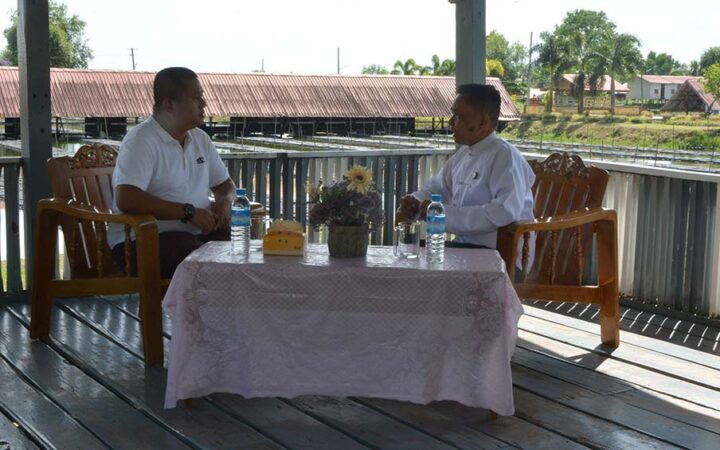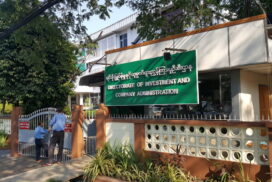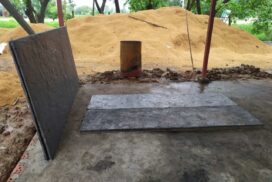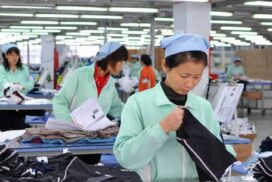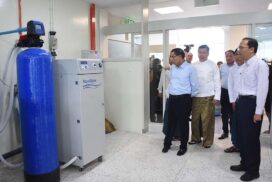Abiding by the guidelines of the Prime Minister to make progress in agriculture and livestock, the backbone of the economy, all the stakeholders in the supply chain are exerting concerted efforts to have industrial growth based on agriculture and livestock products. Sunflower soft-shell crab farming, run by Sunflower Co Ltd, located in Kyauktan Township, Thanlyin District, Yangon Region, is a successful soft-shell crab farming business.
Following is the interview with U Win Myo Lin from Sunflower soft-shell crab farming.
When did you start getting into the crab farming business?
When the Kyauktan Shrimp Farming Zone was implemented in 2000 to effectuate the nation’s economic growth, ten companies started executing shrimp farming operations. Most of the livestock companies turned to potential soft-shell crab farming in 2007. The Department of Fisheries designated some areas as soft-shell crab farming zones; we commenced running this business in 2009.
Could you elaborate on capital investment and the number of farming acres for the soft-shell crab business?
The soft-shell crab farming camp covers 99.06 acres. We started the business with only four farms. Each farm is 2-acre wide. The company has expanded to 25 farms, with three acres and four water lakes.
Please explain the crab population and soft-shell crab production?
If farming operations are in full swing, about 1.5 million crabs can be farmed. The soft-shell crab production is 20 tonnes a month.
How do you find raw materials for soft-shell crab production?
We rely on mud crabs or wild-caught crabs dwelling in mangrove forests, rivers and the mouth of the sea as raw material for soft-shell crab business.
For farming, we buy natural crabs weighing above 80 grammes from the Pyapon, Bogale and Labutta areas. This business creates job opportunities for marine workers in Delta regions and helps contribute to community development.
Would you please explain the soft-shell crab production stages step by step?
The wild-caught crabs are systematically farmed at the crab farms, under the close monitoring of the staff by day and night shifts. We provide feedstuff in line with the standards of the Food and Drug Administration. When they have matured and outgrown their shell to 15-20 per cent growth beyond their original size, those soft-shell crabs are collected and sent to a temporary storage tank with oxygen treatment. They are delivered to cold storage facilities after discarding the dirt. After processing them step by step, they are ready to be packaged.
How many countries do you export the soft-shell crabs to? What label symbolizes your business?
They are distributed to local hotels and restaurants and shipped to foreign countries under the Frozen Myanmar Soft Shell Crab label according to the customized packaging style of those countries that place the order. They are primarily exported to China, Australia, the US, the UAE, and Europe.
Please tell me about the service to the consumers?
Soft-shell crabs are value-added products, so they are ready to cook.
Could you please reveal the advantages of soft-shell crab farming?
We follow the instructions given by the experts to ensure no environmental impact. The shells of the crabs can be recycled to biofertilizer. It is a zero-waste product and environmentally friendly.
How do you use waste crab shells in compost?
For recycling waste crab shells, after sun drying the shell, the powder is used as a compost and an amino organic solution to treat plants.
How do you handle biofertilizer from waste crab shells?
We distributed biofertilizer (amino organic folio fertilizer and land treatment fertilizer) under the brand Wathondray in the domestic market. We also conducted awareness training for the farmers regarding organic fertilizer.
Please let me know the number of staff and employment management?
We employ about 200 staff. We also provide accommodation for the married and the single separately. Additionally, we support educating the employees’ children and the religious house and library to improve IQ, EQ, and literary skills. Moreover, we have a health care service plan as well.
Is there anything you would like to add?
Our soft-shell crab farming business creates job opportunities for locals and contributes to economic growth.
The GNLM genuinely appreciated your interview.
Interview By Kyauktan (IPRD)
Translated By EM
